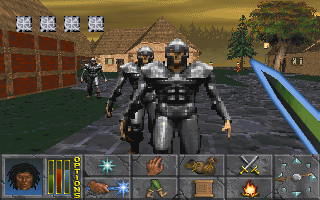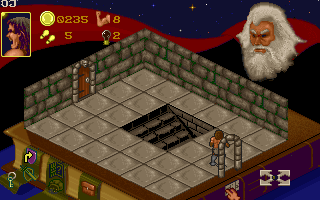Post by Luna on Oct 29, 2014 21:43:27 GMT
When I have free time, I'll actually often opt to play old DOS games, mainly because I enjoy them so much, so I'm deciding to make a little list of the ones I like to play, and including links so you guys can give them a try if you want to.
1: Master of Orion II: Battle at Antares - 1996
A 4x (explore, expand, exploit, exterminate) game that takes place in massive galaxies filled with different kinds of planets and strange space monsters. The game is 8 players (single and multi) and each are out to either destroy each other or ally to prosper. Each player is the emperor/empress of their race and has control over every planet their race lives on. In order to improve, players need to research different technology and build upon their planets and star fleets. The multiplayer interaction goes deeper than just killing each other, as treaties can be formed along with alliances, and technology can be traded or gifted to aid a player who is behind. The game is won when either a player is crowned emperor/empress of the galaxy, (by vote) or when a player has wiped out all traces of other races. Easily one of the best games in it's genre and is damn good in multiplayer.

2: The Elder Scrolls II: Daggerfall - 1996
The second Elder Scrolls game and was released exclusively for DOS (as far as I know). The game plays much like the other games in it's series, being a character driven first person RPG. The game uses a (hidden) dice mechanic for it's combat, similar to Dungeons and Dragons despite being in real-time (for better or for worse) and most famously, has one of the biggest worlds of any RPG, beaten only by a few games, and is still the biggest Elder Scrolls game. The continent of Daggerfall is huge, though a lot of it is somewhat empty, thankfully fast travel is available as soon as the player escapes the first dungeon. All of the Elder Scrolls traditions are in this game, such as the guilds and all of the different races. The game hasn't aged too well and isn't too pretty to look at, but that doesn't take away from it being enjoyable. The game has a much different conversation system, in that a long list of keywords combined with a use (such as "where is xxxx") is used as opposed to the short list of questions/responses that the later games have. The game is a lot more complicated and a lot more difficult than later games, but if you can get past that, then a ton of playtime is to be found in Daggerfall.

3: Worms United - 1996

3: Worms United - 1996
Worms is a long running (and not very changing) series and was originally developed by a young-ish Andy Davidson before he was even part of Team 17 (who helped finish make it and publish it). The gameplay is simple; using air physics with the projectile weapons(though not all work like that), kill all four of each enemy team's worms. Worms United is an expanded version of the original Worms, featuring new level themes and weapons. The game doesn't have any sort of single player component, as the multiplayer and single player are the same thing. The game has a somewhat long list of teams, and they can all be changed or overwritten. Each worm in a team can be named, and when making a team, it can be decided whether it be playable or whether it be a bot team(for those of you who have no friends). The game is great to play against friends, however the multiplayer is hotseat only, meaning you all have to use the same computer and the same mouse and keyboard.

4: Hero Quest - 1991

4: Hero Quest - 1991
Hero Quest was originally a board game that was at it's core a simplified version of Dungeons & Dragons. It actually gained quite a lot of popularity here in England (I still have it) and as with anything popular, eventually got it's own game. The game itself is about as simple as the board game, with a bit less randomness in it. Like in the board game, the player picks between the four main characters (which closely mimic the Gauntlet characters) and set off. The game has a long list of dungeons to go through, each having it's own quest. Despite being a PC game, it still plays somewhat like a board game, using a die to move along tiles, and the combat using the skulls and shields battle dice.The game is on an isometric view which may make a player get disorientated since the game's map is straight. Another small issue is that none of the buttons have text on them, which means they have be learned by using them. Once those have been figured through, the game becomes a very enjoyable RPG, though if it has it, I can't find the multiplayer. (which was what made the board game so fun)

5: Hugo's House of Horrors - 1990

5: Hugo's House of Horrors - 1990
Certainly not the best game on this list, and even looks really cheap, is Hugo. The game is a text based adventure game with arrow based movement, similar to what Lucas Arts released a ton of around the time. The game involves Hugo going through a "horror" house to rescue his girlfriend Penelope. All actions in the game must be typed in though the game doesn't seem very picky on how you do each action and has a fairly sizable list of acceptable actions. The game is full of old (old old old old old) horror tropes that seem so lame it's almost ironic. The game has a lot of instant deaths, though not an unfair amount, so it's a good thing there's a quick save button. The game isn't too hard, and should only take about two hours to get through your first time but is a nice distraction nonetheless.

6: Descent II - 1996

6: Descent II - 1996
Descent II (just trust me when I say it's better than the first) has to be one of the best first person shooters of it's time, even against things such as DooM. The game's main feature is the fact that you're shooting from a small space ship, which means that omnidirectional shooting is in play, which at the time was rare since most FPS were made to play like DooM. Since Descent II allows you to move and fire in all directions, the map is a lot more dynamically designed than other shooters, and was possibly one of the first games to have a 3D map system implemented. The game isn't too easy, and it's very possible to forget how much health you have when fighting the robots, but death is forgiving since you lose no progress from it. The game does borrow some tropes from DooM, such as how there are card keys to open certain doors. The game has a fair few amount of weapons to find, and thankfully they are all useful (though all limited). The game is also fully playable in competitive and cooperative multiplayer which is a blast to go through. The controls take some getting used to, though it is possible to (awkwardly) get a controller to work. A ton of fun and possibly has more replayability than DooM.


